Surprise– eating clean and exercising doesn’t make you a “healthy” person.
Healthy living is beyond exercising.
Living healthily is a conscious effort to take care of your physical body and mental health. “Self-care” is a phrase you have probably heard often, especially lately, and with good reason! Self-care addresses your physical health- lack of sleep, limited exercise, diet, etc., as well as mental health- stress, relationships, life changes, etc.
We have two main automatic regulatory nervous systems (autonomic nervous system):
- the sympathetic nervous system
- parasympathetic nervous systems
These systems help to regulate breathing, digestion, heart rate, etc. without a conscious effort. In other words, these things happen without us thinking about them or deciding they will happen.
The sympathetic nervous system is known as the stress response. You may have heard of this as the “fight or flight” response. The parasympathetic is the “rest and digest” response- the system that calms you down.
Here is an example of how the sympathetic nervous system works:
Imagine being stuck in traffic when you are late to work. You might start to clench your jaw or grip your steering wheel. In that moment you are feeding your body stress.
This stress activates the sympathetic nervous system and causes the body to tense up and release cortisol. Cortisol is released during any stressful event from the adrenal glands that sit above the kidneys.
Whether you are stuck in traffic or being chased by a tiger, bodies react in the same way.
Chronically stressing our bodies, can cause:
- Hypertension (high blood pressure)
- Obesity
- Anxiety
- Depression
- Chronic pain Muscle tension (Harvard Publishing, 2020)
Keep this in mind if you are experiencing chronic pain. It could be caused by stress and not just misalignment. Although there are many things that are out of our control, you can use some of the tips below to help manage your stress.
Tips on reducing stress:
- Diaphragmatic breathing: Place your hand on your chest and your lower belly/ribs. As you inhale, feel your lower belly and ribs expand. This helps to activate the parasympathetic nervous system
- Planning ahead: Try to avoid running late when possible. This gives you ample time to get you’re your destination without being stressed by traffic and other factors that you cannot control.
- Mindfulness: Check in with yourself, do you feel tense in your body? Take a minute to breath and ask yourself why you are tense and focus on relaxing the muscles that feel tense.
- Avoid foods high in sugar: Try to maintain your blood sugar levels. Eating too much sugar and caffeine can spike your cortisol levels.
- Exercise: Go on a 15 to 20-minute walk outside in the sun. This will help to calm your sympathetic nervous system. (Zankert S., Kudielka, B., Wust, S., 2020)
Of course, this just scratches the surface and we are here to help along the way! Stress can also exacerbate issues with your physical body that you might already have. In our office, we look at our clients holistically to see how all elements can add or take away from feeling your best. Ready to start feeling better? Book an appointment with us now!
Written by: Mary Grimberg PT, DPT, OCS
Sources:
- Harvard Publishing. (2020, July 6). Understanding the stress response. Retrieved February 24, 2021, from https://www.health.harvard.edu/staying-healthy/understanding-the-stress-response
- Zankert S., Kudielka, B., Wust, S. (2020, May). Effect of sugar administration on cortisol responses to acute psychosocial stress. Retrieved February 24, 2021, from https://pubmed.ncbi.nlm.nih.gov/32163799/




